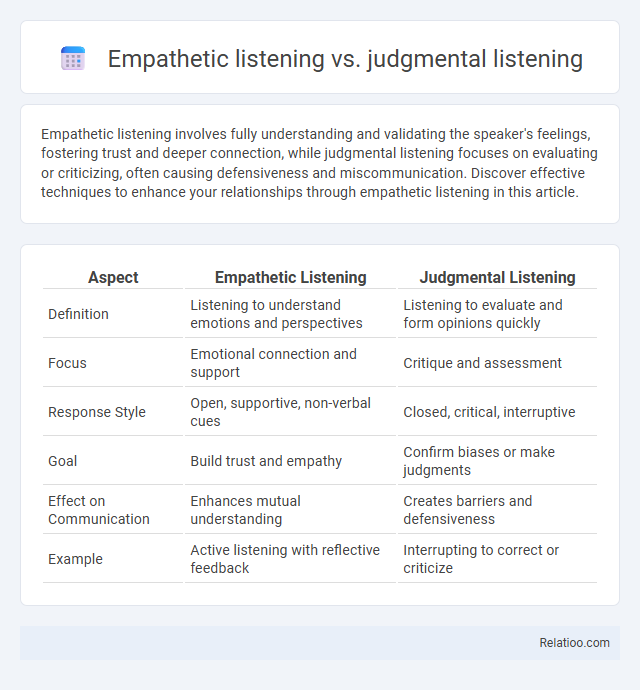Empathetic listening involves fully understanding and validating the speaker's feelings, fostering trust and deeper connection, while judgmental listening focuses on evaluating or criticizing, often causing defensiveness and miscommunication. Discover effective techniques to enhance your relationships through empathetic listening in this article.
Table of Comparison
| Aspect | Empathetic Listening | Judgmental Listening |
|---|---|---|
| Definition | Listening to understand emotions and perspectives | Listening to evaluate and form opinions quickly |
| Focus | Emotional connection and support | Critique and assessment |
| Response Style | Open, supportive, non-verbal cues | Closed, critical, interruptive |
| Goal | Build trust and empathy | Confirm biases or make judgments |
| Effect on Communication | Enhances mutual understanding | Creates barriers and defensiveness |
| Example | Active listening with reflective feedback | Interrupting to correct or criticize |
Understanding Empathetic Listening
Empathetic listening involves genuinely understanding and sharing the feelings of the speaker, promoting trust and effective communication. Judgmental listening focuses on evaluating or critiquing the speaker's message, often leading to misunderstandings and conflict. Cultivating an empathetic attitude enhances emotional intelligence and fosters stronger interpersonal connections by prioritizing compassion over criticism.
Defining Judgmental Listening
Judgmental listening involves evaluating and critiquing the speaker's message rather than understanding their perspective, often leading to premature conclusions or defensiveness. In contrast, empathetic listening prioritizes comprehension and emotional connection, fostering open communication and trust. A judgmental attitude amplifies judgmental listening by embedding bias and negativity, which obstructs genuine dialogue and conflict resolution.
Key Differences Between Empathetic and Judgmental Listening
Empathetic listening involves actively understanding and sharing the speaker's feelings, creating a supportive and non-judgmental communication environment. Judgmental listening, by contrast, focuses on evaluating or criticizing the speaker's words, often leading to misunderstandings and defensiveness. The key difference lies in the listener's attitude: empathetic listening fosters open dialogue and emotional connection, whereas judgmental listening imposes bias and hinders effective communication.
Benefits of Practicing Empathetic Listening
Practicing empathetic listening enhances your ability to deeply understand others' emotions and perspectives, fostering stronger relationships and trust. Unlike judgmental listening or a judgmental attitude that create barriers and misunderstandings, empathetic listening promotes open communication and reduces conflict. Your emotional intelligence improves, leading to better problem-solving and increased collaboration in personal and professional environments.
Consequences of Judgmental Listening
Judgmental listening often leads to misunderstandings, damaged relationships, and decreased trust, impacting your ability to connect effectively. Unlike empathetic listening, which fosters openness and support, judgmental listening creates barriers by focusing on criticism rather than understanding. Consequences include increased conflict, emotional withdrawal, and reduced collaboration in both personal and professional settings.
Techniques to Cultivate Empathetic Listening
Empathetic listening involves fully focusing on the speaker's emotions and perspective, using techniques such as active listening, maintaining open body language, and asking clarifying questions to foster understanding and trust. Judgmental listening occurs when the listener evaluates or critiques the speaker's message prematurely, often leading to defensiveness and communication breakdown. Overcoming a judgmental attitude requires practicing patience, suspending personal biases, and consciously adopting a non-judgmental mindset to create a supportive environment that encourages honest dialogue.
Common Signs of Judgmental Listening
Common signs of judgmental listening include interrupting the speaker, forming premature conclusions, and focusing on faults rather than understanding the message. This approach contrasts with empathetic listening, which prioritizes emotional connection and openness to the speaker's perspective. Recognizing these signs helps you foster more meaningful and nonjudgmental communication.
Impact on Relationships: Empathetic vs Judgmental Listening
Empathetic listening fosters trust and emotional connection by genuinely understanding and validating Your feelings, which strengthens relationships. Judgmental listening, however, creates barriers through criticism or dismissal, leading to misunderstandings and emotional distance. A judgmental attitude exacerbates conflict, while an empathetic approach encourages open communication and lasting bonds.
Overcoming Barriers to Empathetic Listening
Overcoming barriers to empathetic listening requires recognizing and addressing judgmental listening habits, which prioritize evaluation over understanding and create emotional distance. Developing an open mindset reduces judgmental attitudes that block genuine connection, enabling active engagement and validation of the speaker's feelings. Techniques like mindful awareness and reflective feedback foster deeper emotional resonance, facilitating effective communication and trust-building in interpersonal relationships.
Transforming Judgmental Habits into Empathetic Skills
Transforming judgmental habits into empathetic skills involves recognizing the difference between empathetic listening, which prioritizes understanding and validating emotions, and judgmental listening, which focuses on evaluating and criticizing the speaker. Developing empathetic skills requires conscious effort to suspend personal biases and cultivate active listening techniques that foster trust and open communication. This shift not only enhances interpersonal relationships but also promotes emotional intelligence and reduces conflict in both personal and professional settings.

Infographic: Empathetic listening vs Judgmental listening
 relatioo.com
relatioo.com